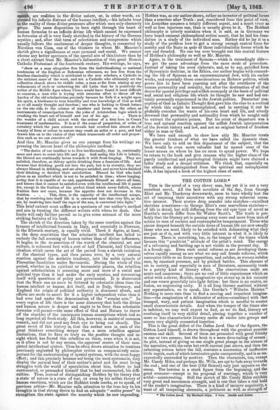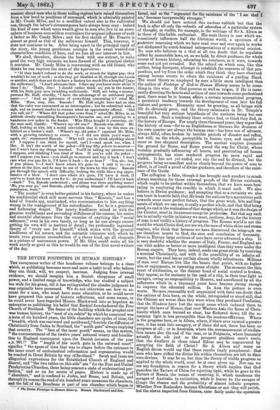THE COTTON LORD.* Tins is the novel of a very
clever man, but yet it is not a very excellent novel. All the best novelists of the day, from George Eliot and Mr. Thackeray downwards, seem to have wholly lost the
art of inspiring their, narratives with any strong coherent narra- tive interest. Their stories drop asunder into sketches—excellent sketches sometimes—in George Eliot's case marvellous sketches— of life in detail, but still differing from the old epic type of novel as Goethe's novels differ from Sir -Walter Scott's. The truth is pro- bably that, the literary art is passing away more and more from men of action to men of canals and contemplative temperament. Those who pierce deepest beneath the outside dress of human life are now usually those who are most likely to be satisfied with delineating what they see just as it is, and with very little interest in what it is likely to become. There is something, too, in the temper of the times which favours this "positivist" attitude of the artist's mind. The energy of a reforming and battling age is not visible in the present'day. It is a female age. Even such social reforms as are developing them- selves rapidly among us are what we may call female reforms, which encounter little or no fierce opposition, and subdue, as women subdue men, by constant pressure, not by pitched battles. This absence of vi: in society, and especially in men of literature, necessarily tends to a patchy .kind of literary effect. The observations made are acute and numerous ; there are no end of little experiences which an artist with a clever, flexible, imaginative eye stores up in his memory and can weave gracefully into light fiction: but there IS no centre, no fusion, no engrossing unity. It is all limp literary materiel, without any organization, so to speak, like Goethe's "Wilhelm Meister." Nothing is more rare than to find a moving and impatient imagina- tion—the imagination of a delineator of action—combined with that tranquil, wary, and patient imagination which is needful to master small characteristic details. And when the temper of the times also is indolent, we may well expect to find, as we do find, literary art confining itself to very skilful detail, piecing together a number of more or less characteristic literary cartes de virile: into groups and scenes very slightly connected-together. - - This is ale great defect of the Cotton Lord. One of the figures, the Cotton Lord himself, is drawn throughout with the greatest possible success and skill. Several of them are presented with great felicity in one or two scenes ; but the book is a mere dove-tailing of scenes : its plot, instead of giving us one single great plunge in the stream of the narrative, with the calm but swift current just above, and then the subsiding stream below the fall, contains a succession of ineffective little rapids, each of which terminates quite unexpectedly, and is as un- expectedly succeeded by another. Then the characters, too, except Mr. Candy Miles, and perhaps Mr. Wills, are apt to fade away towards the end ; and one of the best (Old Grissel) only just appears on the scene. The heroine is a stock figure from the beginning, and the good overseer—except in his proposal of marriage, which is very artful—uninteresting. Still the sketch of Mr. Candy Miles exhibits very great and uncommon strength, and is one that takes a real hold of the reader's imagination. There is a kind of incisive angularity, a want of all tempering elements, a jerkiness as well as strength of •
The Cotton Lord. By Herbert Glyn. 2 vole. Smith and Elder.
manner about men who in those toiling regions have raised themselves from a low level to positions of command, which is admirably painted in Mr. Candy Miles, and to a modified extent also in the cultivated son, though the lattees circumstances have always been easy: indeed the kind of ease which mere wealth gives to men who live in an atmo- sphere of business-men seldom neutralizes the original influence of such a father as Mr. Candy Miles ; and the first sketch of Mr. Francis is almost as good as that of the millowner himself. This, however, it does not continue to be. After being upset in the principal rapid of the story, the young gentleman emerges in the usual washed-out characterless condition of hero, and we lose all our interest in him. We shall, therefore, dismiss the book with one extract, to make good the very high estimate we have formed of the principal sketch it contains. Mr. Candy Miles is conversing with an old friend, who thinks he can improve the state of the operatives :
"'If they hadn't refused to do the work, or struck for higher pay, they wouldn't be out of work ; or else they get disabled or ill, through one excess or another, and it does not do to have a factory too much like a hospital' [says the millowner]. I don't advocate that. I dare say you know more about it than I do." Hallo, Jim! I should rather think so,' put in the master, with his little grey eyes twinkling maliciously. Still, not being a master,' pursued Mr. Hall, sturdily, I have the advantage of an unbiassed judg- ment—"And an ignorance of everything concerning it!' cried Mr. Miles. 'Here, stop, Jim. Rascals !' Mr. Hall might have had an idea that the valet was summoned as an interruption ; but he submitted with a sigh, and an inward resolve to resume when an opportunity offered. Did you call, sir?' ' Where did that poker come from ?' asked Mr. Miles, in an attitude closely resembling Buonaparte's favourite one, and pointing to a handsome new poker in the fender. 'Miss Eliza bought it yesterday, sir,' the man said, timidly. Where's my old one ?' Rascals was silent. M;•. Hall, looking at him, felt a moral conviction that it was by this time ex- hibited on a broker's stall. Where's my old poker ?' repeated Mr. Miles, with a growing tendency to storm. did not think you'd want it again, sir,' stammered Rascals. Who told you to think anything about it? I suppose I can think for myself, can't I—and speak too, when I like. It isn't the worth of the poker—I'll buy fifty pokers to-morrow- but I won't have my things touched. You'll be taking my pictures next, I suppose, and thinking I was tired of them. If you've sold the poker— and I suppose you have—you shall go to-morrow and buy it back : I don't care what you pay for it, I'll have it back : do ye hear?' Yes, sir; but, if you please, I—I don't know where it's gone to. I sold it to—to a person at the door, and he may be out of the town by this time.' Rascals got through this speech with difficulty, looking the while like a dog appre- hensive of a blow. I don't care where it's gone, I'll have it back, if you've to hunt the town over for it : do you understand ? have it back —back !' Yes, Rascals understood • and please was there anything more? 'No, you may go," and Rascals, gladly availing himself of the ungracious permission, went."
"The master" is even better painted in his factory, where he makes his confidential clerk still more nervous than "Rascals," and has a kind of female spy, unattached, who communicates to him anything wrong in the management of his subordinates. Yet he is a generous and forbearing despot. The hearty kindliness mixed in with the genuine worldliness and pervading wilfulness of the master, his entire and scornful abstinence from the exercise of anything like "moral influence," even in his own family, so long as he can always ensure getting his own will in matters of detail ; the profoundly ingrained theory of "every one for himself," which mixes with the general kindliness of his nature, and the sarcastic tolerance with which he treats even genuine scoundrelism of a clever kind, a.,re all elements in a picture of uncommon power. If Mr. Glyn could make all his work nearly as good as this he would be one of the first novel-writers of the day.































 Previous page
Previous page